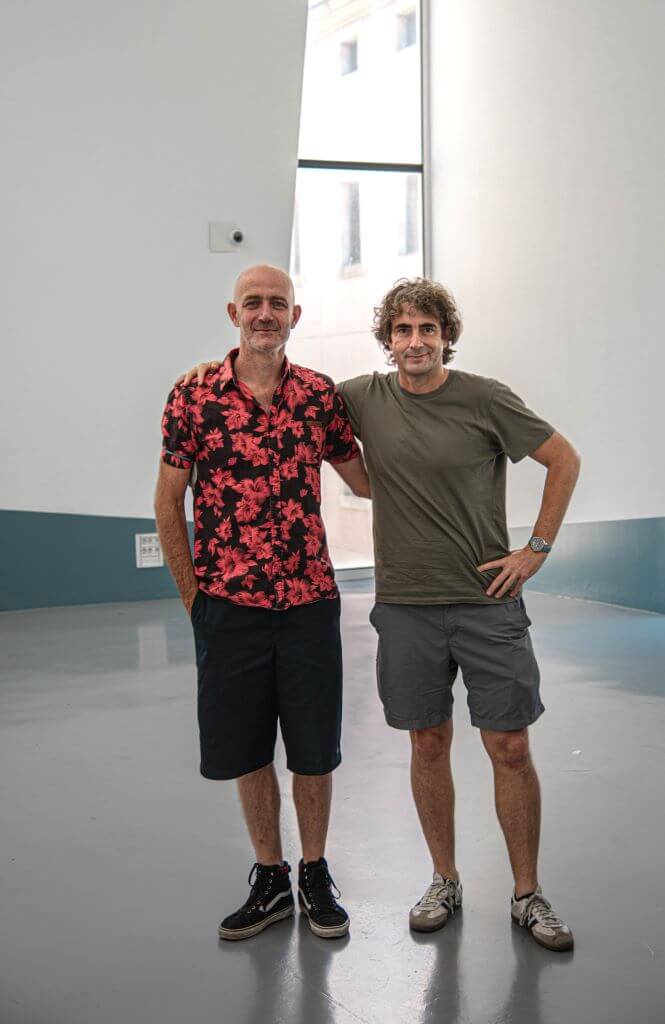Artist statement
La Conquesta del Pol Sud is a theatre company created in 2010 in Barcelona by Carles Fernández Giua and Eugenio Szwarcer (both with international origins). LCPS distinctive feature is to combine on stage the experience of real-life testimonies, filmed image and creative research.
La Conquesta del Pol Sud is an international theatre company both in the sense of globally touring their performances, but also in the aim to research & create in an international context.
We have specialised in the creation of scenic documentaries that place testimony and the witness at the heart of the production and focus on the relationship between individual experience and collective history.
Our trilogy “Nadia”, “Claudia” and “Rapahëlle” follows the history and the life journey of three women: from Afghanistan, Argentina and France. “A Land Full of Heroes” explores the story of Romanian writer Carmen-F. Banciu and “MIVION (RadioSarajevo)” confronts the experiences of Bosnians journalist Boban Minic and Azra Suljic with a young Spanish actor.
Basis of our work:
Our starting point at an ideological level is to avoid intermediaries. In other words, how can the theatre guide us towards a direct understanding of the world? How can we offer the viewer, a part of society, the opportunity to draw conclusions by directly accessing the sources?
The central theme in our pieces is the relationship between the individual and the collective. The former is provided by the life experience of our witnesses. The latter emerges from the company’s work with documentary sources. We are interested in finding the points of contact between one and the other. In other words, we are interested in juxtaposing individual experience with certain facts of collective relevance. In our performances, history is embodied in the voices of those giving testimony. Together, we build scenic moments that move between factual details and individual emotions.
In our assemblies there are no intermediaries. On stage there are no ‘actors’ who interpret emotions, sensations and characters. La Conquesta del Pol Sud constructs its performances from the direct experience of individuals, who, via the symbolic space of the stage, relate to the public.
Together with us, those giving testimony are authors of our pieces. This shared authorship is essential to preserve the ethical integrity of our work. The narrative that emerges from our performances has been previously agreed in depth.
Maybe we live more surrounded by fiction than we think. In the digital age, our sources of information are limited to what we observe through a screen.
Perhaps the theatre can offer a space for reality.
Reality also breaks through onto the stage through our own direct experiences arising during our documentation trip: an unequivocal and irreplaceable part of the originality of the work of La Conquesta del Pol Sud.
The trip is designed as an essential part of the creation process. Through the trip, members of the company’s creative team enter the world of the witness and become part of it. In the first person, they confront other perspectives; they forge experiences and their own vision that enter into dialogue with those of the protagonist of the piece.
Finally, with regard to form, we use all the languages that the particular context can offer; our work is marked by eclecticism. We are constantly researching around the idea of mixing different languages and forms on stage. Throughout our development as a company, we have perfected the integration of the image projected on stage, turning it into a character in itself. We combine archive images and others, most of them obtained by us in our process of documentation. We use brief dialogues and theatrical scenes based on improvisation. We play games with objects and create moments descriptive of the spaces we have visited … We are interested in creating a performance as rich and complex as possible, with both informative moments and those of great poetic and visual power.
In our work, then, the notion of ‘assembly’ is essential, that is, a combination of the various elements, the dialogue established between the different languages: how the word coexists with the image, the movement with the sound, an interview with a witness statement, etc. Our work seeks to create an ideal space for the viewer to build associations, contrasts and conflicts between these elements, so that, perhaps, from all this the rare poetry of reality emerges.
We like to see in our documentary theatre a form of knowledge that brings together reason and emotion in the same space.
